|
I believe it was Isaac Newton who said that we build too many walls and not enough bridges, a call for peace and unity that has repeatedly fallen on deaf ears, particularly those of despotic world leaders. It seems particularly perverse that people who celebrated the fall of a wall that once divided Germany are now cheering at the prospect of slapping a 3,100km one up on the border between America and Mexico, a project driven more by rampant xenophobia than logic. If the timeline of the still unfinished one being built by Israel along the West Bank is anything to go by, even if they do get started on the American one, I'll be long dead before it's ever completed. And it won't be, of course. Opposition to it is so vociferous that even if Trump somehow manages to get the money from Congress to get it started, a future government is almost sure to halt it before it gets far. It's a viewpoint sublimely captured by banners held aloft by young people on the recent Women's March that emphatically stated, "If you build a wall my generation will knock it down." Sometimes, you really can have faith in the future.
The issue of the border between the US and Mexico is a long-standing one that fires up emotions on both sides of the debate and is too complex and layered for me to go into here in the detail necessary for anything approaching a balanced discussion. The trafficking of drugs across this border drove the narrative of one of the finest American films of recent years in the shape of Denis Villeneuve's riveting Sicario, but 33 years earlier it was also the basis for the unfussily titled, The Border.
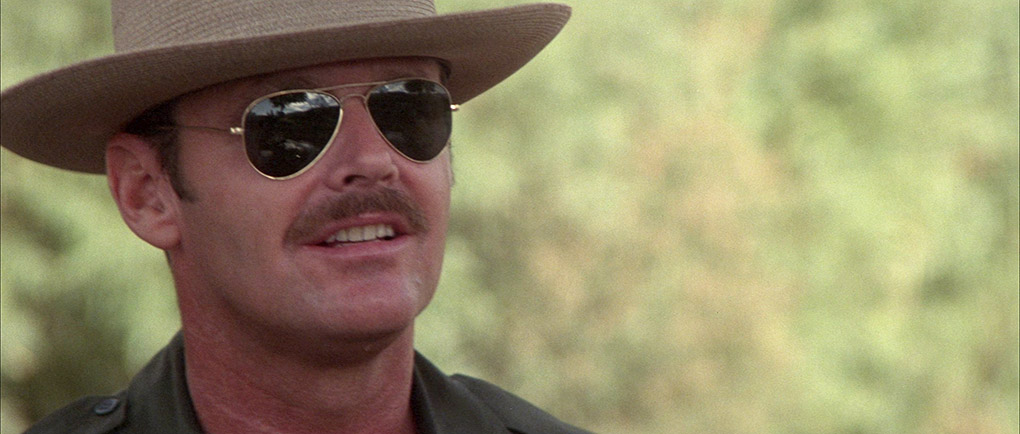
Jack Nicholson plays Charlie Smith, a Los Angeles immigration officer with a conscience who carries out his duties without cheer but seems genuinely concerned about the welfare of the Mexican migrants he is charged with rounding up for deportation. He lives in a trailer park with his wife Marcy, who dreams of the better life she believes they could have if they moved into a spacious duplex in El Paso next door to her friend, Savannah, whose husband Cat works for the Border Patrol. Charlie muses on the idea of going back to working for the Parks and Recreation service, but in the blink of an edit he has joined the Border Patrol and is heading to his new home in El Paso with Marcy. He's not been in the job long before he is invited to join a moneymaking scheme run by Cat and their supervisor, Red, that involves smuggling Mexicans across the border. Initially he resists, but with Marcy on a house-fitting spending spree, he eventually acquiesces. By this point he has become transfixed by Maria, a young single mother who lives in a broken-down shack just beyond the shallow river that divides the two countries, and he begins to take an active interest in her fate.
When I first saw The Border shortly after its release, I remember thinking it was interesting but that it lacked that certain something required to get me back for a second viewing. Years later, with the announcement that Indicator were releasing it on Blu-ray, I struggled to recall why the film had failed to excite me. It certainly has plenty in its theoretical favour. It was the first American film from British social realism pioneer Tony Richardson, whose previous work had included – deep breath – Look Back in Anger, The Entertainer, A Taste of Honey, The Loneliness of the Long Distance Runner, Tom Jones, The Loved One and The Charge of the Light Brigade. And then there's the cast. Not only do you have Jack Nicholson in the lead, but Cat is played by Harvey Keitel, Red by Warren Oates, Marcy by Valerie Perrine, and Maria by then newcomer Elpidia Carrillo, who went on to have featured roles in Oliver Stone's Salvador, John McTiernan's Predator and Ken Loach's Bread and Roses. On top of that, the music is by Ry Cooder, whose scores for Walter Hill's The Long Riders and Southern Comfort and Wim Wenders' Paris, Texas are among my very favourites. Surely, I reasoned, I had misjudged the film. Coming back to it after all these years, however, my reaction was similar. It's an interesting work, and there are several aspects of it that I will have no problem championing, but I was again left with the nagging sense that it was not all it could or perhaps even should have been.
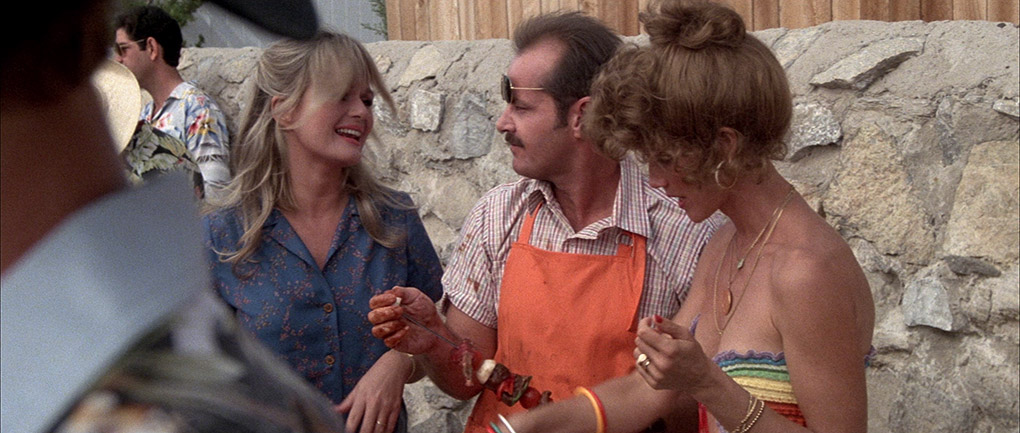
It's certainly not coy about its subtext, with the aspirational materialism and comfortable living of the American border guards starkly contrasted by the poverty of the Mexicans living just over the border. This is, of course, a point well worth making, as increasing levels of social inequality plunge even more people worldwide into poverty so that the already obscenely rich can boast to their friends that they now have more money than they will ever think of spending. Indeed, it is this very inequality the prompts a sizeable number of the late-night border crossings that Charlie and his comrades are charged with intercepting, as penniless Mexicans make their way into America to work in low-paid jobs that precious few locals would be willing to do. The Border certainly acknowledges this but does tend to paint its picture in sometimes broad strokes, contrasting Marcy's twittering aspirational materialism with Maria's poverty and desperation, and the corruption of the American Border Patrol officers with her air of saintly innocence. The grimness of her predicament is hammered home further by her treatment at the hands of Cat's Mexican dealmaker Manuel (Mike Gomez), an almost stereotypical oily sleazeball with slicked-back hair, a stubbly beard, oversized shades and a shifty grin. He enlists an accomplice to steal Maria's baby in order to sell it to a high-paying American family (at the time of filming, this sort of trafficking was very real), and later has her working in his bar as a hooker. Even Charlie's story has a degree of button-pushing to it, as this essentially honest man is lured onto the dark side by financial hardship, is forced into compliance when he tries to draw the line, then is willing to risk all for an act of moral redemption.
What makes much of the above more involving than it may sound from my flip overview is down in no small part to Richardson's low-key direction and a string of fine performances from a very strong cast. Keitel and Oates are as impressive as ever, and there's an earnest honesty to Elpidia Carrillo's portrayal of Maria that keeps the halo that intermittently threatens to hover over her head firmly at bay. But it's Nicholson who proves the chief attraction here in a controlled performance that harks back to the work that first established him as a major force in American cinema. He convincingly grounds Charlie in reality, to the degree that you can feel every ounce of his weariness and dissatisfaction with his life without ever being told the full reasons behind it. We never know for sure why he feels compelled to help Maria – initially it seems that he is attracted to her, but in a perfectly judged scene in which he provides her with financial help and she assumes he is buying sexual favours, we learn for sure that this is not the case. And it doesn't seem to matter – so finely judged is Nicholson's portrayal that it only matters to us that he has his reasons and that they are clearly important to his fragile wellbeing.
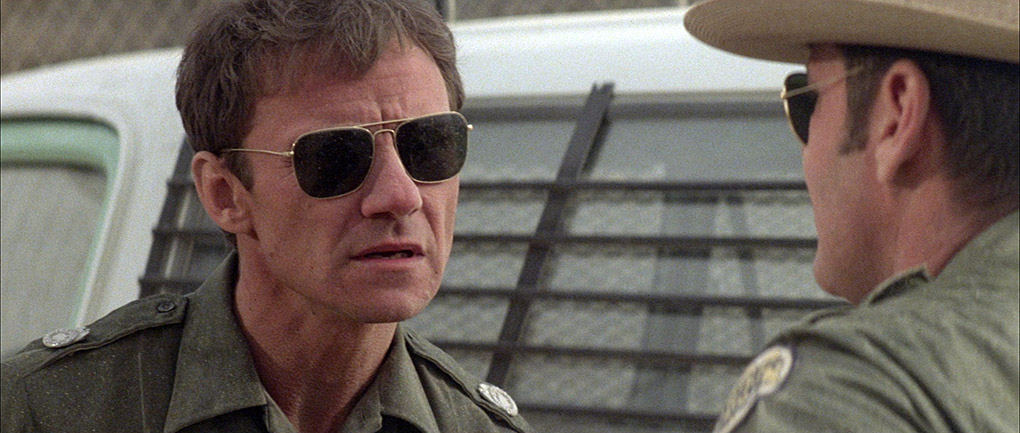
Richardson's desire to avoid what he described pejoratively as Clint Eastwood action scenes means that even when verbal disagreements dissolve into armed conflict, it's handled in a matter-of-fact manner that favours realism over obvious thrills, though this itself provides a few tense moments. The specifics of Richardson's original ending and why it was reshot are covered in detail in the extras on this disc – Richardson has said he preferred the new ending, and while I completely empathise with his and its intentions, for me it feels abrupt and leaves the film feeling somehow incomplete. It's clear that the journey that leads to this conclusion will have consequences that the film chooses not to address (something it seems the original ending did), instead freeze-framing on a moment designed to provide the audience with a sense of satisfaction but which left this member of it with a slew of questions about what will likely happen next in a story that has not finished playing out.
I remain oddly unsure about The Border. It intermittently flirts with character cliché, gently digs where I sometimes wish it would bite, and aspects of its narrative follow a formulaic route. But it is also peppered with sequences that really resonate, and the cast alone is worth the price of admission. This is particularly true of Nicholson, whose restraint and ability to emote and suggest his thought process through facial expression, even when wearing sunglasses, is a handy reminder of just how strong a screen actor he could be when given the right role.
Framed in the original aspect ratio of 2.35:1, this is another strong HD transfer from Indicator. The image is sharp, and the detail crisply rendered without any obvious enhancement, which also delivers a pleasingly organic degree of film grain. The film's often earthy colour palette, which reflects both the locale and the uniforms of the Border Patrol officers, is faithfully reproduced, and the contrast graded well enough to keep the black levels snappy but not lose detail scenes set at night or in dimmer interiors. As you would expect, the image is clean, with precious few of dust spots and no trace of damage.
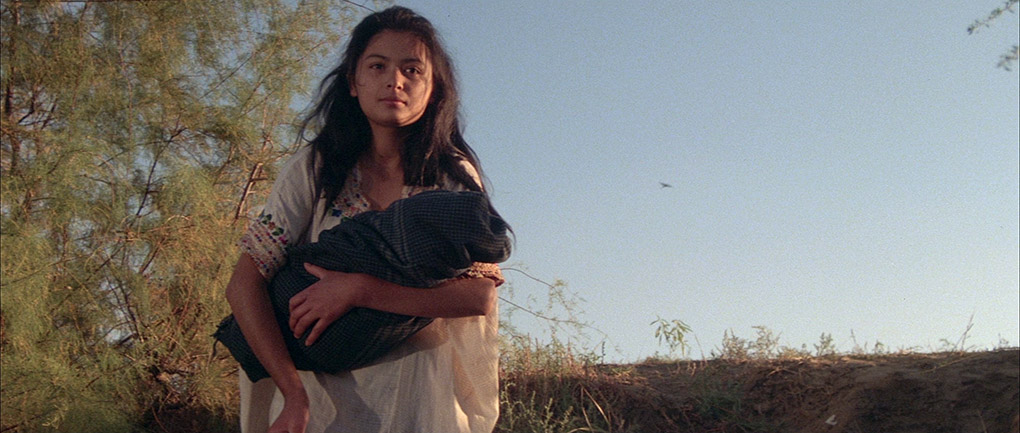
The Linear PCM 1.0 mono soundtrack is also free of any former wear and tear and captures the dialogue and effects clearly, and certainly does well by Ry Cooder's music score.
Optional English subtitles for the deaf and hearing impaired are also available.
Audio Commentary with Nick Pinkerton
Freelance journalist, film programmer and Sight & Sound contributor Nick Pinkerton delivers a consistently informative commentary on the film and its background, one peppered with information on the filmmakers and actors, as well as some details on the situation and activities depicted in the film. Details on the original ending and the reshoot are also provided, and there are plenty of quotes from the production's key personnel.
The Guardian/BFI Tribute to Tony Richardson (57:20)
A valuable inclusion for the personnel involved alone, this celebration of the life and work of director Tony Richardson, conducted at the National Film Theatre in 1992 after a preview screening of Richardson's final film, Blue Sky, features filmmakers Lindsay Anderson, Karel Reisz and Kevin Brownlow, actor Vanessa Redgrave and production designer Jocelyn Herbert. All of the participants recall how they first met Richardson, and there's a general discussion on what he was like to work with, plus tributes aplenty to his creative and filmmaking skills. This is preceded by an introduction to the film itself by Richardson's actor daughter Natasha.
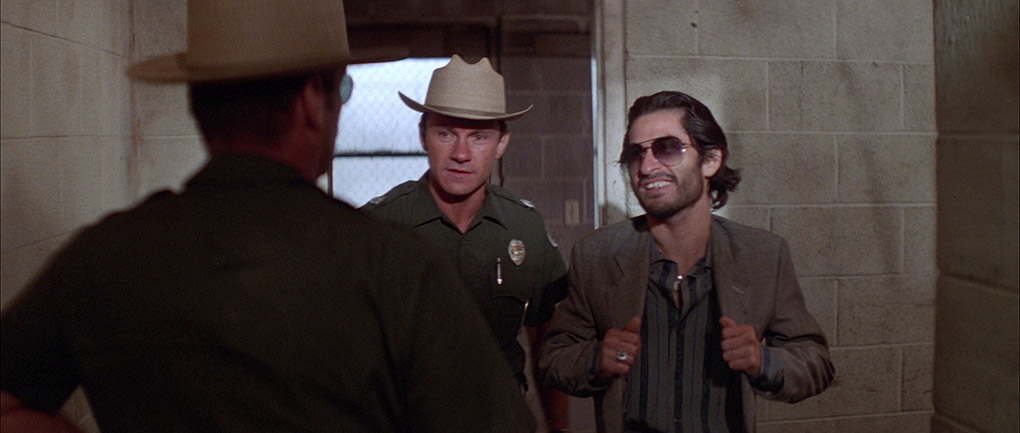
Theatrical Trailer (1:47)
A misleading attempt to sell the film as a taut action thriller that includes a smattering of spoilers. "The border. It divided the land, it divided the man."
Image Gallery
An even mix of monochrome and colour promotional stills, plus five international posters.
Booklet
Following full credits for the film, we have a solid new essay on the film by Scott Harrison, then a welcome extract from Tony Richardson's memoir, in which he talks about the genesis and development of the project and working with Jack Nicholson and Harvey Keitel. After this, there's a short extract from a 1993 interview with co-screenwriter Walon Green, and a thoughtful 1982 Cinéaste review by Lori Porter, who makes some valid points even when criticising the film.
I'm still in two minds about The Border, which I enjoyed revisiting for its performances, its low-key handling and its renewed topicality, yet I still struggled to get behind it as enthusiastically as some others have. It's absolutely worth seeing for Nicholson alone, and with Trump still going out of his way to demonise Latinos, it's rather heartening to watch a film in which the physical border that he continues to claim is integral to the country's security comes across as a symbol of American corruption. No problems at all with the disc, which sports a first-class transfer and some fine special features, and thus comes warmly recommended.
|